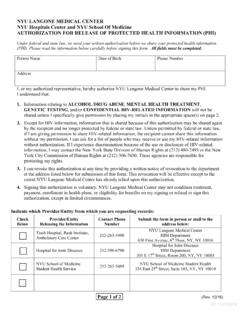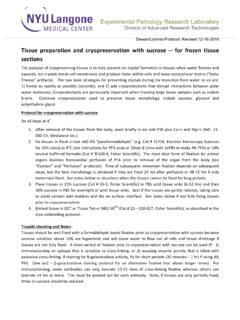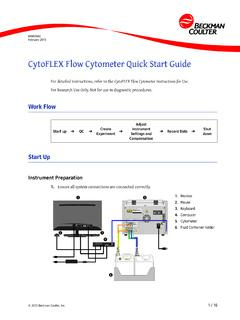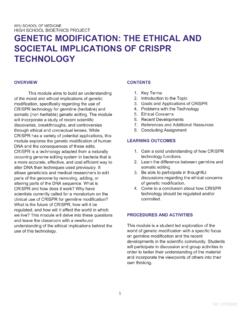Transcription of Hungry bone syndrome - NYU Langone Health
1 Hungry bone syndrome Background In recent years, secondary hyperparathyroidism has been mainly managed by combination treatment with calcium salts and calcitriol Treatment is effective in early stages but as secondary PT progresses, hypercalcemia/hyperphosphatemia prevail. VitD metabolites, calcimimetics or Aluminium-and Ca-free phosphate- binding agents Parathyroidectomy Is the treatment of choice in patients with severe HPT which failed medical therapy: --persistently high serum PTH levels (>800pg/ml) in the presence of hypercalcemia and/or hyperphosphatemia -- bone pain, myopathy, metastatic calcifications, pruritis Parathyroidectomy A relatively safe operation mortality of < morbidity in terms of laryngeal nerve palsy of < re-operative rate of for control of local bleeding Jofre et al.
2 Kid Int. 2003; 63 (Suppl. 85): S97 S100. Complications: Hypocalcemia Incidence: 20-70%. hypoparathyroidism from removal of all parathyroid tissue transient vascular compromise of the remaining parathyroid tissue long-term hypercalcemic suppression of non- adenomatous parathyroid tissue. extensive remineralization of the skeleton Hungry bone syndrome In patients with hyperparathyroidism: -- bone formation and bone resorption are both increased, bone mass loss is due to acceleration of bone resorption that is greater than the increased mineral apposition rate. --After correction of hyperparathyroidism, increased bone remodeling units will mineralize and balance will be towards synthesis of bone with subsequent hypocalcemia and hypophosphatemia.
3 Incidence 329 patients on HD, 30 patients on PD retrospectively examined. 148 pts (145 HD, 3 PD)underwent parathyroidectomy. 20% developed Hungry bone syndrome despite high doses of oral or intravenous calcium and treatment with calcitriol Jofre et al. Kid Int. 2003; 63 (Suppl. 85): S97 S100. Risk factors Retrospective analyis of 218 patients admitted for parathyroidectomy for primary HPT. Patients with secondary hyperparathyroidism due to ESRD were excluded. Variables studied: age, sex, duration of documented hypercalcemia, indication for surgery, complications attributable to hyperparathyroidism, and family history of primary hyperparathyroidism.
4 Laboratory parameters analyzed: total serum Ca , inorganic Phos, albumin, Mag, Alk Phos, BUN, Cr, N-terminal PTH, serum 25hydroxyvitamin D, urine specific gravity, 24-hr urinary Ca, and cortical bone density . Brasier et al. Am J Med 1988; 84: 654 660. Brasier et al. Am J Med 1988; 84: 654 660. Brasier et al. Am J Med 1988; 84: 654 660. Brasier et al. Am J Med 1988; 84: 654 660. Prevention: 1) Calcitriol 2) Bisphosphonates Calcitriol Randomized, placebo controlled, double blinded study Investigate whether the administration of calcitriol was of significant benefit in the treatment of hypocalcemia after PTx 14 ESRD on HD with severe secondary HPT underwent PTx Patients in each group were supplemented with calcium as well as calcitriol, or placebo 24 hrs after surgery Starting dose: calcium carbonate 8g and calcitriol 2mcg/day Clair et al.
5 Nephron 1987 46: 18-22. Clair et al. Nephron 1987 46: 18-22. Clair et al. Nephron 1987 46: 18-22. Clair et al. Nephron 1987 46: 18-22. Calcitriol 20 patients on HD with severe HPT underwent PTx Patients assigned to either a tx group(A) or control group(B). (A) group: received Ca supplements +calcitriol PO. (B): received Ca supplements and placebo Aim of the study is to rule out acute effects of calcitriol administration on bone cells in HD pts undergoing PTx because of severe secondary HPT. Acute changes in serum levels of bone markers of synthesis and resorption evaluated in pts with or without calcitriol tx. Mazafarro et al. Nephrol Dial Transplant.
6 2000 Jun;15(6):877-82. Mazafarro et al. Nephrol Dial Transplant. 2000 Jun;15(6):877-82. Total dose of IV Ca administered was not different between the 2. groups Total dose of PO Ca administered was statistically lower in group A. Group A had significantly higher Serum Ca levels at day 15 than group B. Mazafarro et al. Nephrol Dial Transplant. 2000 Jun;15(6):877-82. AP, BGP, PICP are markers of bone synthesis ICTP is a marker of bone resorption The fall in ICTP serum levels and increment of PICP could explain hypocalcemia after PTx This phenomenon is not affected by Vit D administration Vit D after PTx improves hypocalcemia mainly through increased intestinal absorption of calcium and enhances calcium efflux across the quiescent layer of bone cells from the rapidly exchangeable pool Mazafarro et al.
7 Nephrol Dial Transplant. 2000 Jun;15(6):877-82. Bisphosphonates Retrospective study, 23 patients. The patients were classified into two groups: HBS group and the non-HBS group Study the effect of preoperative administration of bisphosphonates on postoperative hypocalcemia in patients with primary hyperparathyroidism. Lee et al. J. bone Miner Metab 2006; 24: 255 8. Dosage of bisphosphonates was not controlled Varying dosages of calcium (and vitamin D) were administered to the subjects after the hypocalcemia occurred. Lee et al. J. bone Miner Metab 2006; 24: 255 8. Bisphosphonates 37 ESRD patients on HD have undergone total (4 gland) surgical parathyroidectomy Aim: to determine whether bisphosphonates administration would reduce the incidence of postoperative HBS, and reduce the necessity for intravenous Ca supplementation Tx group: administered 30 mg disodium pamidronate(if wt >80kg) and 45mg (if wt>80 kg), 1 2 days before surgery Both groups.
8 Oral vit D analogue started preoperatively, with PO Ca, and dialysates were switched from low-Ca to higher-Ca solutions For standard tx group, iCa was measured according to the protocol 36 times, and all patients (10/10) required more than one intravenous calcium bolus. for the pamidronate group, ionized calcium was measured according to the protocol 12. times, and only two patients (2/27) in the pamidronate group required intravenous calcium (. P < ). The mean length of hospital stay for the pamidronate group following PTX was +/- days, whereas that for the standard treatment group was +/- days (P < ). In a subset of patients, six controls and 10 of the pamidronate group, DEXA scans were available for review both before parathyroidectomy, and post surgery, median 20 months (range 6 26).
9 After PTx, the increase in bone mineral density at both the lumbar spine (L1 L4) and the femoral neck were less in the pamidronate group (not statistically significant). Treatment Oral calcium supplementation: 2-4 g of elemental calcium/day IV calcium if rapid or progressive reduction in serum Ca or symptoms related to hypocalcemia or Serum Ca< mg/dl Vit D supplementation Magnesium supplementation Correction of hypophosphatemia only if severe (<1mg/dl).










